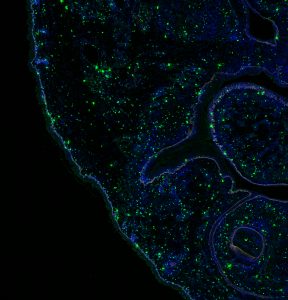Oral & Craniofacial Biomedicine
Oral & Craniofacial Biomedicine
Program Website: https://dentistry.unc.edu/advanced-dental-education/oral-craniofacial-biomedicine/
Director of Graduate Studies: Ceib Phillips, PhD, MPH
Student Services Specialist: Chloe Dixon
Program Overview

The primary mission of the PhD Graduate Program in Oral and Craniofacial Biomedicine is to prepare individuals for careers in research and education in academia or in industry, particularly in oral health related fields, and to provide these individuals with the expertise necessary to become leaders in the field of oral health research. Graduates have the qualifications and research expertise to be productive faculty members at leading universities and senior scientists in academic or industrial settings.
Oral and craniofacial biomedicine at UNC-CH encompasses the study of the structure and function of normal and abnormal tissues of the oral cavity and craniofacial complex, as well as disease and healing mechanisms specific to various oral conditions. Attention in dental research and practice is now on the dynamics of oral disease and prevention and treatment at the earliest stages of development, including research on risk factors for disease and cellular and molecular events in disease pathogenesis. Another focus of modern oral and craniofacial biomedicine is the basic, translational, and clinical study of the relationship between oral conditions, health status and systemic disease.
Our curriculum is highly translational in nature; combining basic laboratory discovery in immunology, embryology, physiology, genetics, cellular and molecular biology, neurobiology, tissue engineering and regeneration, pharmacology, microbiology, and biochemistry to aid in our understanding of oral diseases and disorders and ultimately to provide treatment for the pathologies associated with the craniofacial region.
Expertise and authority in these areas are well represented among participating faculty members from the UNC-CH Schools of Dentistry, Medicine and Pharmacy, and from the Lineberger Cancer Center. Curricular requirements are tailored to each area along with common core requirements for all trainees leading to an individualized didactic program.
General Program of study
The overall program is designed to be highly flexible to meet the diverse scientific goals of individual students. Students are required, each year, to present a poster at the annual Dental Research in Review or at a professional meeting and to give an oral presentation on current research progress. The general program includes:
| Year 1: Class work, laboratory rotations, weekly concentration seminars, selection of a research mentor. | |
| Year 2: Complete coursework, pass a written preliminary examination prepared as a research proposal in NIH grant format and an oral preliminary examination on the research proposal and basic concepts | |
| Year 3: Become intensively involved in research. | |
| Year 4/5: Publish two papers (at least one first-author), write a doctoral dissertation, and present a public seminar of your research results. |
Coursework
There are 8 (minimum) required courses that may be taken, in part, during the first year in addition to the BBSP curriculum. These courses include:
- OCBM 730, 731 & 732 (Introduction to Oral Biology)
- OCBM 710 (Research in Progress)
- OCBM 770 (Seminar/Journal Club)
- OCBM 780 (Grant Writing)
The remaining required courses (including concentration specific courses) may be taken in the second year of study. The curriculum is very flexible and individually tailored to each student’s interests and goals. Elective courses may be taken throughout the UNC-CH graduate curriculum.
Qualifying Exams
Written Exam: The written candidacy exam format is a research proposal patterned in the format of an R01 NIH grant proposal. The exam is understood to be an expression of each student’s independent ability to formulate an experimental approach and adequately express it on paper. The exam is given at the end of the fourth academic semester and is graded as pass/fail by a committee consisting of three Graduate School faculty members. Students have 8 weeks to complete the written portion.
Oral Examination: The oral candidacy exam is given as soon as possible but not later than 3 months after receiving notification of passage of the written exam. The oral exam centers on the topic of the written prelim as well as basic concepts in oral biology and in your chosen concentration. The oral exam committee consists of the 3 written examiners plus 2 additional members.
Dissertation
Dissertation Research: Students begin intensive research on a dissertation topic in the 3rdyear. The dissertation committee must consist of at least five persons: the dissertation advisor and at least 4 members of the Graduate faculty, 2 of which must have a primary appointment with the Oral Biology Curriculum.
Publication Requirement: Before graduation, students must have carried out sufficient research for at least two papers (one must be a first-author publication) in a high-quality refereed journal, either published or submitted for publication.
